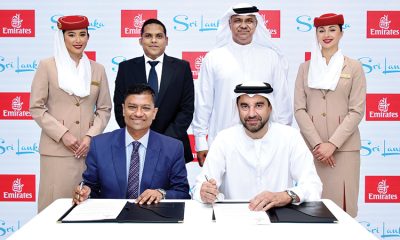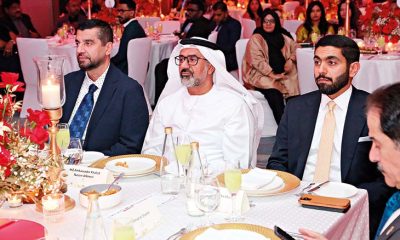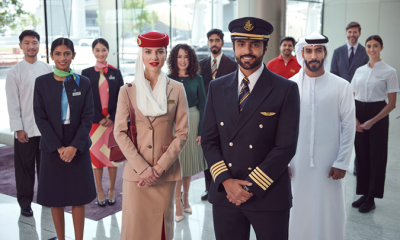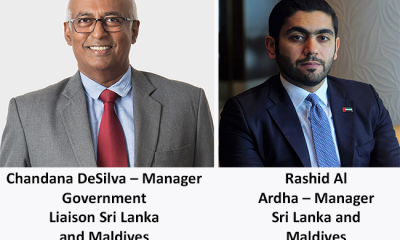Business
Emirates Group ‘delivers a new record performance’

The Emirates Group on May 13 released its 2023-24 Annual Report, hitting new record profit, revenue, and cash balance levels, an Emirates press release said.
Extracts of the release: ‘Both Emirates and dnata saw significant profit and revenue increases in 2023-24, as the Group expanded its operations around the world to meet strong customer demand for its high-quality products and services.
‘For the financial year ended 31 March 2024, the Emirates Group posted a record profit of AED 18.7 billion (US$ 5.1 billion), up 71% compared with an AED 10.9 billion (US$ 3.0 billion) profit for last year. The Group’s revenue was AED 137.3 billion (US$ 37.4 billion), an increase of 15% over last year’s results. The Group’s cash balance was AED 47.1 billion (US$ 12.8 billion), the highest ever reported, up 11% from last year.
‘Combined Group profits for the last 2 years, at AED 29.6 billion, surpass pandemic losses of AED 25.9 billion during 2020-2022.
‘Sheikh Ahmed bin Saeed Al Maktoum, chairman and Chief Executive, Emirates airline and Group said: “The Emirates Group has once again raised the bar to deliver a new record performance. Throughout the year, we saw high demand for air transport and travel related services around the world, and because we were able to move quickly to deliver what customers want, we achieved tremendous results. We are reaping the benefit of years of non-stop investments in our products and services, in building strong partnerships, and in the capabilities of our talented people.
“Huge credit is also due to the UAE’s visionary leaders, especially HH Sheikh Mohammed bin Rashid Al Maktoum, Vice President and Prime Minister of the UAE and Ruler of Dubai. It is thanks to their leadership and the nation’s progressive policies that the Emirates Group is able to flourish. Both Emirates and dnata have forged successful business models leveraging Dubai’s unique advantages, in turn generating enormous value for Dubai and the communities they serve around the world.”
‘Sheikh Ahmed added: “The Group’s excellent financial standing today places us in a strong position for future growth and success. It enables us to invest to deliver even better products, services, and more value to our customers and stakeholders.”
‘Many major projects are already underway, including: a multibillion-dollar aircraft fleet and cabin renewal programme; new catering, cargo, and ground handling capabilities; advanced technologies to support the Group’s operations; expanded training and people development programmes; and initiatives to progress the Group’s sustainability agenda.’
The full 2023-24 Annual Report of the Emirates Group – comprising Emirates, dnata and their subsidiaries – is available at: www.theemiratesgroup.com/annualreport.
Business
Cabinet approves CECB as consultant for renovation of the Karainagar boat yard project
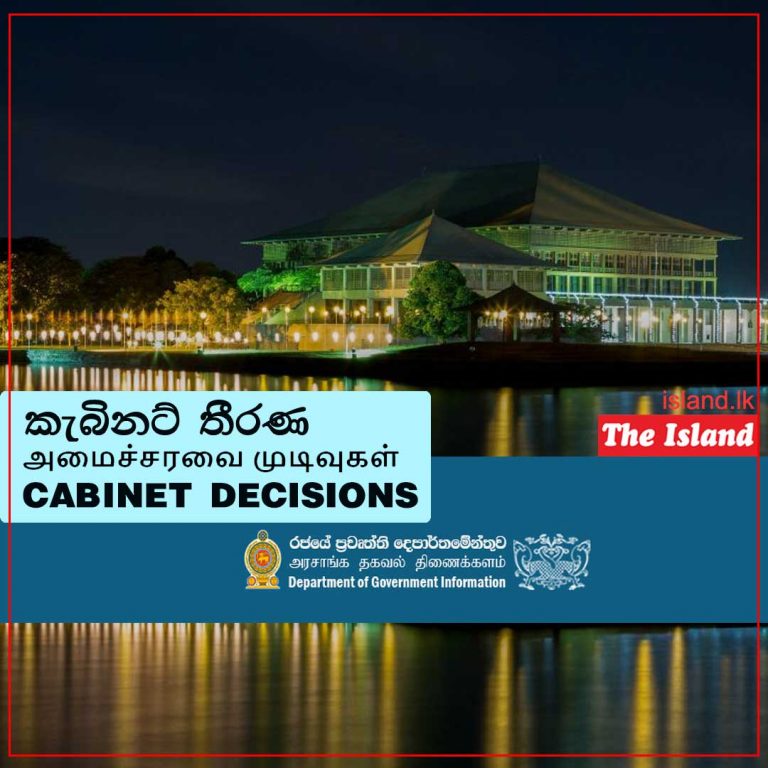
The Cabinet of Ministers has approved the proposal presented by the Minister of Fisheries, Aquatic and Marine Resources to seek the services of the Central Engineering Consultancy Bureau as a consultant for the renovation of the Karainagar boat yard project and allocate 40 million rupees from the Treasury for the expenditure to be borne by the Government of Sri Lanka.
[A memorandum of understanding was signed by the President during his official visit to India in December 2024. , to obtain a grant from the Government of India for the renovation of the Karainagar Boat Yard
According to the MOU, the responsibility of providing the technical consultancy service for the project and exempting the goods and equipment related to the grant from taxes has been assigned to the government of Sri Lanka.]
Business
‘Transformative infrastructure’ installed at Colombo West International Terminal

In a landmark move for Sri Lanka’s logistics landscape, EFL Project Logistics has completed a critical phase of deliveries for the Colombo West International Terminal (CWIT), a transformative infrastructure project poised to reshape the country’s role in global maritime trade.
CWIT—a collaboration between Adani Ports and SEZ Ltd (51%), John Keells Holdings and the Sri Lanka Ports Authority—is set to be the island’s first fully automated deep-water terminal. As it gears up for full commercial operations in 2025, the recent arrival of high-tech port handling equipment marks a key economic inflection point for Sri Lanka.
Speaking exclusively to The Island Financial Review on the impact, Mohamed Niyas, General Manager – Project Logistics at EFL, said, “The logistics we executed for CWIT are more than just cargo movements; they are catalysts for economic transformation. These deliveries—ranging from electric inter-terminal trucks to automated gantry cranes—are essential to positioning Sri Lanka as a sustainable, high-capacity transshipment hub.”
Among the highlights of the operation were 62 state-of-the-art Sany electric trucks and massive quay and gantry cranes, representing not only a technical leap but also a green one. These advancements contribute to CWIT’s eco-efficient design and bolster Colombo’s capacity to handle up to 15 million TEUs by 2026.
Economically, the development of CWIT—and EFL’s role in its expedited setup—signals a push for increased foreign direct investment, enhanced export competitiveness and job creation across the logistics and engineering sectors. As Niyas emphasized, “We are not just helping move cargo; we are enabling national economic value. Every successful delivery brings us closer to a future where Sri Lanka is a leading player in the South Asian maritime corridor.”
With global shipping routes evolving and automation driving next-gen port operations, CWIT is seen as a strategic asset for long-term growth. EFL’s role in the project showcases the kind of logistics innovation necessary to support this ambition—efficient, sustainable and globally competitive.
By Ifham Nizam
Business
Marine Tourism Roadmap for Sri Lanka launched by SLTDA

Sri Lanka marked a major milestone in its tourism development efforts with the official launch of the Marine Tourism Roadmap on April 10 in Colombo. This initiative, led by the Sri Lanka Tourism Development Authority (SLTDA) with support from the Asian Development Bank (ADB) under its technical assistance program TA9881 SRI: Supporting Tourism Resilience, lays the groundwork for a new chapter in tourism and the nation’s blue economy.
The Marine Tourism Roadmap was developed through an extensive process of data collection, stakeholder consultations and site visits conducted by the ADB appointed international consultant together with officials of the SLTDA. The final validation of the Roadmap was done by the Marine Tourism Steering Committee, which included representatives from key marine related public and private sector institutions. International expertise was provided by Ms. Aleksandra Dragozet (CEO & Founder – Sea Going Green), ADB’s appointed marine tourism consultant, whose guidance ensured the strategy aligned with global best practices for sustainable tourism. The SLTDA officials, Dr. Prasad Jayasuriya, Director-Tourism Planning, Development & Investments and S Dadeepan, Assistant Director-Tourism Planning & Development coordinated all meetings, site visits and activities with relevant stakeholders and the Steering Committee.
The Marine Tourism Roadmap emphasizes a balanced approach between conservation and economic development, promoting eco-friendly activities such as diving, snorkeling, ship wreck diving and marine wildlife watching. These activities are designed to support local livelihoods while safeguarding Sri Lanka’s rich marine biodiversity, particularly coral reefs, marine mammals, and fragile coastal habitats that face increasing environmental pressure. The strategy outlines two categories of coastal destinations: areas covering Kalpitiya through Galle to Trincomalee, which possess established marine tourism industries; and areas covering Mannar, Jaffna and the North-Eastern coastal belt, which are recognized for their emerging tourism potential. Notably, Sri Lanka’s ocean territory is nearly seven times larger than its landmass, highlighting the vast, untapped opportunities for marine-based tourism. The roadmap presents both short-term and long-term implementation strategies, aiming to develop sustainable marine tourism infrastructure, enhance visitor experiences, and ensure the protection and resilience of marine ecosystems in the years ahead.
The Roadmap itself was the result of collaboration among stakeholders covering coastal areas of Negombo, Kalpitiya, Mannar, Jaffna, Mullativu, Trincomalee and Galle and also the Steering committee members representing 18 key marine related public and private sector institutions including Presidential Secretariat, Ministry of Tourism and the SLTDA. This unified approach ensured that the document reflects the diverse perspectives of stakeholders directly involved in marine and coastal tourism development.
-

 Business4 days ago
Business4 days agoDIMO pioneers major fleet expansion with Tata SIGNA Prime Movers for ILM
-

 News3 days ago
News3 days agoFamily discovers rare species thought to be extinct for over a century in home garden
-

 Features6 days ago
Features6 days agoNipping the two leaves and the bud
-

 Features5 days ago
Features5 days agoProf. Lal Tennekoon: An illustrious but utterly unpretentious and much -loved academic
-

 Features6 days ago
Features6 days agoAvurudu celebrations … galore
-

 Foreign News3 days ago
Foreign News3 days agoChina races robots against humans in Beijing half marathon
-

 News6 days ago
News6 days agoCounsel for Pilleyan alleges govt. bid to force confession
-

 Editorial4 days ago
Editorial4 days agoSelective use of PTA



